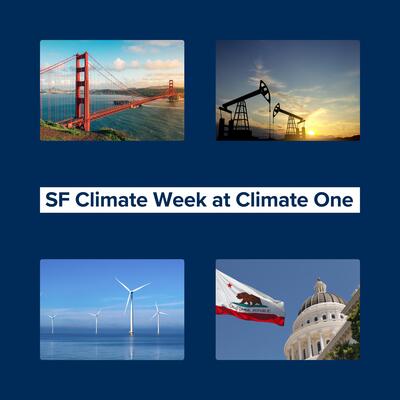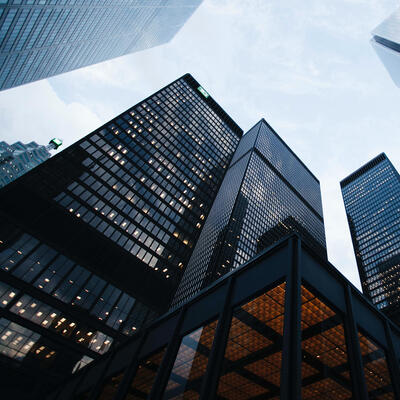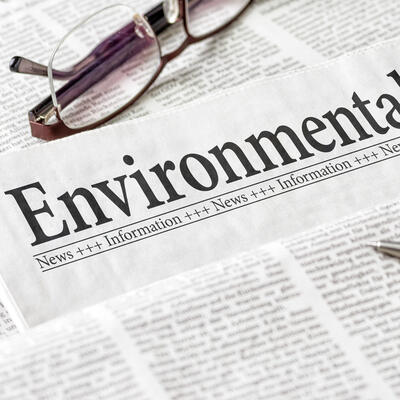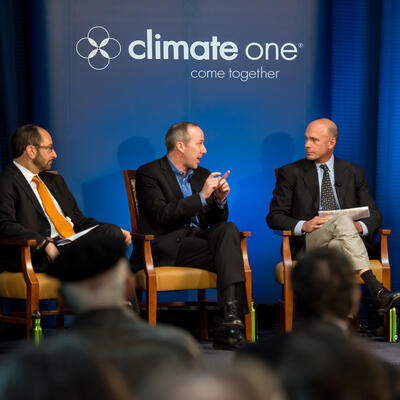
Is Silicon Valley as Green as it Claims?
Guests
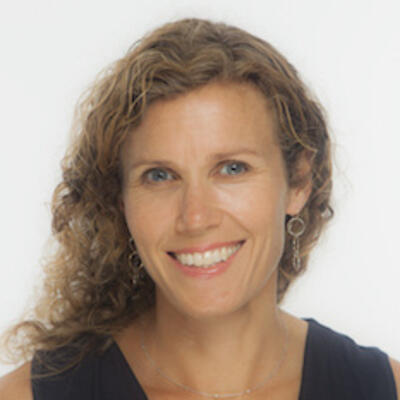
Lynelle Cameron

Aron Cramer

Patrick Flynn
Summary
Tech companies are cleaning up their data centers and building shiny new buildings that sip water and energy. But are they really as green as they claim? Many companies issued statements in support of the Paris climate agreement, but their actions will be more important than their statements. According to guest Aron Cramer from BSR, the way we measure how green companies are needs an update. “Companies should be judged not only on what they do, which is more traditional,” Cramer says, “but also what they enable through their partnerships and what kinds of policy frameworks they seek to create.”
Lynelle Cameron, Vice President of Sustainability at Autodesk
Aron Cramer, President and CEO, Business for Social Responsibility
Patrick Flynn, Senior Director of Sustainability, Salesforce
This program was recorded live at The Commonwealth Club in San Francisco on March 6, 2018.
Full Transcript
Announcer: This is Climate One, changing the conversation about energy, economy and the environment.
Patrick Flynn: We know that sustainable business is better business, that sustainable businesses do more with less – less energy, less water, less waste, less materials.
Announcer: Tech companies are cleaning up their data centers and moving into shiny new buildings with small carbon footprints. But is Silicon Valley really as green it claims?
Aaron Cramer: Companies should be judged not only on what they do, but also what they enable through their partnerships and what kinds of policy frameworks they seek to create.
Announcer: After all, those same tech companies are masters of marketing hype and manipulating human behavior.
Lynelle Cameron: We have an incredible opportunity but also responsibility to put the right tools on the market for people to be able to understand the energy or the materials impact of everything.
Announcer: Green capitalism in Silicon Valley. Up next on Climate One.
Announcer: Is Silicon Valley really as green as it claims? Welcome to Climate One; I’m Devon Strolovitch. On today’s show, host Greg Dalton asks how Silicon Valley tech companies are changing to reduce their carbon footprints.
When President Trump announced in 2017 that the U.S. would eventually exit the Paris climate accord, the CEOs of Apple, Google, Facebook and Microsoft quickly criticized the move. They were responding to pressures from competitors, customers and their employees. Many tech companies have strong and long-standing commitments to cleaner power. Yet those same companies are masters of marketing hype and manipulating human behavior. Are they really as green as they claim?
To explore Silicon Valley's role in cleaning up the global economy, Greg welcomes three guests. Aron Cramer is CEO of Business for Social Responsibility, a consulting firm. Patrick Flynn is Senior Director of Sustainability at Salesforce, a cloud computing company. And Lynelle Cameron is Vice President of Sustainability at Autodesk, which produces software used in design and building.
Here’s our conversation about the carbon footprint of the tech economy.
Greg Dalton: Lynelle, let’s begin with you. What's the business case for caring about climate and energy. Why does tech companies care, what’s the business reason?
Lynelle Cameron: Well at Autodesk and maybe let me just first say we’re in the business of. So Autodesk makes design in engineering software that's used by people to build quite literally anything on the planet. So if you think about the phone in your pocket. Think about the car that you came here on or public transit, the building that we’re in, even the movies that entertain you. These are all things that Autodesk customers design and make. And so when we think about energy and climate and the future, we have an incredible opportunity but also responsibility to put the right tools on the market for people to be able to understand the energy or the materials impact of everything. Whether it's a manufacturing process or building an entire city and that's what we’re in the business of is actually helping people design and make more things but make them better and make them with less negative impact.
Greg Dalton: And one of the earliest industries on board in the whole sustainability thing was architecture. Because that’s -- and a lot there using Autodesk software because they clearly saw early the return on the investment. The reason like greener buildings make business sense.
Lynelle Cameron: Absolutely. And that’s probably the most tangible thing and probably the earliest area that we’ve seen dramatic change here is in green buildings. And for Autodesk, when we started this journey 10 years ago we didn’t actually have any LEED certified buildings. So that was the first step was learning by example and really thinking about our own building footprints. And the journey has been great along the way. We actually see Autodesk as a living laboratory. So we need to test out things that our customers are going to be faced with. And our most recent facility is up in Toronto. We moved into this building a year ago and it's the first building anywhere that's been designed using a technology called generative design which you probably heard about in a manufacturing context, but, you know, you optimize for energy and materials and daylighting and travel path. But we actually surveyed all the inhabitants, the employees, to ask them how often do you like to go get coffee? How does sound impact your work? Who do you need to meet with? We plug all that in to the computer and it generates and explores thousands, millions of options in the computing environment and then gives us the optimal designs for what we were designing for. So if anyone has a chance to go to Toronto, it’s an incredible space. Now we’re testing another one of our tools on seeing how the building performs. Building operations, which is another new frontier for us that we’re learning by doing.
Greg Dalton: And hopefully no one runs into glass walls when they are on the way to get coffee. Patrick Flynn, there was an all hands meeting at one point that’s kind of the origin of the sustainability story at Salesforce. Tell us about that story.
Patrick Flynn: Yeah, you know Salesforce is a company that really thinks about trust and transparency as its number one value. So it’s very typical to have an all hands meeting where everybody is invited where anybody can stand up and ask a question to the CEO. And a woman name Sue Amar stood up and asked the CEO “Why don't we have a program for environmental sustainability” and he said “We do now and you're gonna run it.” And from there, was born our sustainability program at Salesforce.
Greg Dalton: And tell us briefly, you have a new tower in San Francisco. The tallest tower in the Western United States something like that. And one of the things that it has we’ll get right to this, you know, it has blackwater recycling, which is unheard of or very rare. So tell us.
Patrick Flynn: Yeah, we’re incredibly proud of the Salesforce tower. So, it’s the tallest office building west of the Mississippi. And it's the most sustainable building in our portfolio. I’ll get to blackwater but first a few things. The base building itself is LEED Platinum certified it's got a fantastically efficient HVAC system that uses outdoor air to properly ventilate the largest underfloor air distribution system which is much more efficient than overhead ductwork. What Salesforce chose to do is fit out that office space with LEED Platinum commercial interiors. And we expect that LEED Platinum commercial interiors project will be the highest rated LEED v4 project for commercial interiors when it's complete. And then, yeah, about a month ago we announced that we would be installing a blackwater system. So blackwater is a water recycling system. It's the same sort of technology that happens in nature that allows rainwater to permeate through and be broken down by the sediment and bacteria and enter the river clean but it's housed within the basement of a building. Now, the impact is dramatic because what it does is it reduces the water footprint of Salesforce tower by an estimated 78%. 7.8 million gallons of water avoided and what that is equivalent to 16,000 California residents’ annual water consumption. So we felt like, you know, a good sustainability strategy is flexible to adapt to the circumstances, whether that's the circumstances of the business or in this case geographic. We know severe drought will return to this region and we felt like it was a great way to respond to the water needs of this area and even more important a great way to demonstrate that blackwater is a fantastic technology that should be deployed and it ends up being the largest commercial blackwater system in the United States in a high-rise building.
Greg Dalton: Must cost a lot of money. You’re doing that partly to hedge against future risk and future costs increase, as well as some PR value, is that fair?
Patrick Flynn: Well, you know, the system eventually pays for itself. The primary reason we do it is because it's the right thing to do. One interesting nuance is we’ve done, Salesforce isn't the sole occupant of the Salesforce Tower. But what we've done is put that in place in the building for the benefit of all tower occupants. So we've gone above and beyond to provide that to others.
Greg Dalton: So everybody in the tower can drink toilet to tap from Salesforce, yeah.
Patrick Flynn: Well, distinction. So going an extra level of detail here is the water that gets treated ends up going to nonpotable destination.
Greg Dalton: Okay.
Patrick Flynn: So toilet flushing, plant irrigation, cooling tower makes up things like that.
Greg Dalton: Greenpeace publishes an annual click and clean report that evaluates and grades major tech companies and their energy footprint. Here’s Gary Cook, who leads that campaign.
[Start Clip]
Gary Cook: So what we focused on at click and clean is extent the major IT companies are using renewable energy and are otherwise trying to reduce their climate footprint. When we started this campaign in 2010 we're initially focusing on companies like Facebook and Apple who are building their data centers and places that were basically increasing demand for coal. And so the challenge at the time was like you guys are going really quickly, you’re going the wrong places, you have options to grow with renewables. You should commit as a company to grow but make smarter decisions about how you grow, where you build your data centers and start traveling on that path. And now we have over 20 IT companies who have made a long-term commitment to be 100% renewable. Salesforce has been, they’re one of the first companies who weren’t building their own data centers to make a long-term commitment to be renewably powered. They’re making progress. They still have a ways to go. They were important trailblazer in the sense that they were customer and showed that the customers can have a big impact on, they have agency to change what’s powering their operations. And so you saw as a result, other companies like Autodesk, like Box and others also begin to follow suit. They made commitments, signaling to market that hey, renewable powers were important to us. We believe in climate change and we want to be having our operations powered with more renewable energy and not increasing demand for more coal.
[End Clip]
Greg Dalton: That’s Gary Cook of Greenpeace. So Aron Cramer, let’s have you respond to that. It’s like, progress they could do more is that, you know, generally your view that they could go faster, doing good things, but they could go faster?
Aron Cramer: So, I think all of us can. And I would say less they and more we because we’re going through a fundamental transition in our energy system. It's not going fast enough there's been amazing progress. Some of the examples that we’re hearing about tonight I'm sure we'll talk about. And we know that we’re not on a trajectory to keep warming at or below 2°C. So more needs to be done by all of us and I think there are a lot of ways that's happening. Some of it is for business reasons that are market signals are very, very powerful, they’re beginning to move. Clean energy is becoming much more affordable. Some of it could be about consumer demand. We’ve got two B2B companies primarily here we should talk about the role of consumers who are enabled through tools developed here in Silicon Valley that sometimes create more consumption. That means more energy consumption. That's an issue we need to think about. And some of it comes from pressure and some of it comes from public policy. So I think it's clear that if you go back 10 years. There are things that are happening now that were on the fringes of the debate 10 years ago. We’ve got companies up here committed to 100% renewable energy there are companies that are committed to 100% electric vehicles over the next several years. Those ideas would have been considered fanciful 10 years ago, they’re now very much in the mainstream and the momentum is really strong. So our biggest enemy here is time. Are we moving fast enough? So far, the answer is no we’re not.
Greg Dalton: Let’s look at some specific companies from Greenpeace who gets an A, Silicon Valley, Apple, Google, Facebook. B, Adobe and Salesforce, who gets a C for their energy consumption, Amazon, HP and IBM. Who gets a D, Oracle and HBO. Who gets an F, Hulu, Pandora and this one hurts NPR. So Aron Cramer, you know, some of those are consumer facing, you deal with lots of companies I don’t expect you to address specifically this report that you aren’t part of but what makes, you know, used to go inside, what makes the difference between an A and F, is it leadership, is it consumer pressure, is it legacy?
Aron Cramer: So I’m gonna consider that score in the next pledge drive I hear on the radio. So here's my take on it. And I haven't analyzed the Greenpeace scores. But the way at BSR we think about this and we think about what a company can do actions that fall into three categories. Act, enable and influence. So first of all what are you doing, you know, with the tools you're creating with the buildings you're producing the things that you generate with your products and services that you have a lot more control over. There's an opportunity for leadership and very often there's a payback. Second is enabling because we all live within ecosystems. So, you know, what the Salesforce Tower is demonstrating here in the city of San Francisco is fantastic. How can that be extended to other new builders, a lot of building going on in the city. So how can that happen? How are you helping your customers become more sustainable? So enabling so much happens through value chains. We have to think about that. And the final bit is influence. And that's actually good news story because over the last several years a lot of companies, including those up here on the stage have been very vocal saying, we need public policies that promote the right kind of energy system. And we saw the business sector step up at Paris in 2015. We saw the business sector step up last year through the We Are Still in campaign saying that the United States should not withdraw from the Paris agreement. And that's a little bit new as well. So I think companies should be judged not only on what they do, which is more traditional, but also what they enable through their partnerships and what kinds of policy frameworks they seek to create.
Announcer: You’re listening to a Climate One conversation about the carbon footprint and the tech economy. Coming up, Greg Dalton asks how Silicon Valley is getting more climate-conscious by moving downtown.
Patrick Flynn: Rather than go out into the suburbs and build a campus, we've chosen to build our offices in city centers. So you get the benefit of mass transit. You get the benefit of the efficiencies of city life, and you've got the opportunity to support local businesses with your lunch decision.
Announcer: That’s up next, when Climate One continues.
Announcer: We continue now with Climate One. Greg Dalton is talking about Silicon Valley’s carbon footprint with Lynelle Cameron, Vice President of Sustainability at Autodesk; Aron Cramer, CEO of Business for Social Responsibility; and Patrick Flynn, Senior Director of Sustainability at Salesforce.
Here’s your host, Greg Dalton.
Greg Dalton: Lynelle Cameron, one of the critiques from U.S. senators who’ve been on this program is that Silicon Valley does lots of great things in their operations and branding, but when it comes to policy engagement, their lobbyists never bring up climate. They talk about immigration. They talk about visas other things, taxes and visas, but they don't want to touch climate because it’s controversial. Should Silicon Valley go to bat more for climate change in Washington?
Lynelle Cameron: So I would actually disagree with the premise. And I think when we see, look at the Paris agreement several years ago we saw private-sector coming together like never before to help actually negotiate that agreement which I think was really, really optimistic. We also saw then with the withdrawal from Paris. This incredible rise of a collective voice from the private sector thanks to BSR and series and many of these other groups and I think companies increasingly want to put their voices together on climate and advocate as a group. But I will also say Greg one of the other thoughts is the language matters. And for some reason the word climate is a lightning rod for many people, especially this company but not only, and I think back to 10 years ago, we were kind of in the same place on sustainability, right. There is a lot more comfort talking about citizenship, corporate social responsibility, but this idea of sustainability and a competitive advantage from a topline perspective, people weren’t comfortable. I know my previous role I wasn't allowed to use the word sustainability initially. I named my group Environmental Strategy and Solutions, two s’s and I’d flip one of them as soon as the company get comfortable with this idea of sustainability. And I think we’re starting to see that with climate as well. We know what we need to do. In the private sector we’re seeing that more and more leading with climate and using the word climate. Even Al Gore is talking about climate without talking --
Greg Dalton: About climate. Sure. I’ve interviewed U.S. senators, Democratic senators who said their Republican colleagues say I can support you, just don't put that climate word on the bill. I can't vote for it if there are climate words in the bill. Patrick Flynn, Salesforce has been quite outspoken on certain social issues in Indiana when there were some marriage equality things that really, you know, punch back pretty hard. But those issues, immigration, you know, marriage equality, those are more personal to people, climate is abstract. And it's not personal, it’s not deemed to be personal. Your thoughts on where climate change fits in terms of Salesforce’s political priorities.
Patrick Flynn: I think everybody has a personal connection to climate and to the environment when you ask them. I think the best thing going for Salesforce is cultural in this journey. And you spoke about our, speaking up in regards to discriminatory legislature. The company was founded with philanthropy integrated from day one, 1% of product, 1% of profit, 1% of employee time. To me that was instrumental in creating a culture that really wants to do well and do good. And one thing we think about is listening to all stakeholders, so customers, employees, communities and the environment as a key stakeholder. And when one of those is in need of our help in need of our voice, we respond. And so I think we do think about climate as an important place for the company can speak up. Just last week I was on the steps of City Hall at a rally in support of the clean power plan. So we do think there are places where we can use our company voice for the environment as one of our critical stakeholders.
Greg Dalton: Aron Cramer, a lot of corporations fossil fuel companies and others and pretty much every economist on the planet says there ought to be some kind of price on carbon pollution. And Rob Walton, chairman of Walmart, elders of the Republican Party, George Shultz, Hank Paulson have all supported this. We just went through a once in a generation tax reform. Nobody spoke up for a price on carbon. Is that true, was there any company who’s saying hey, this is a chance to put a price on carbon we’re doing this huge once in a generation deal. Did any company stand up for something that many corporate leaders profess they support?
Aron Cramer: There may have been some but it was very much at the margins. And I would agree with you, I think is a massive lost opportunity because while climate may seem abstract to people, there are actually elements of it that aren't. So Governor Jay Inslee of Washington had a great quote the other day saying “Climate used to be a graph or a chart. Now it's the flood in my backyard.” And that is something that people understand and we’re seeing. We saw it in Boston last week and not to mention Harvey, et cetera, et cetera. There are a lot of examples unfortunately. So I think there was an opportunity here that was lost. And I would agree with the premise of your question and I think unfortunately I think the business community has stood up over the last well, last several years, last 16 months, in particular in a whole range of issues, But I think the opportunity to reduce corporate taxes and to reduce regulation was too much to be avoided and most companies decided to focus on the shorter term than these other questions. You know there are all sorts of models out there like the so-called feebate system where you've got a carbon tax and monies returned to people. I think it could be sold because I think you can construct something that says, you’re gonna pay a little more at the gas pump, but you’re gonna get a check every month or you’re gonna have your income taxes reduced. And so there's a way to do it and I think we missed a massive opportunity.
Greg Dalton: Lynelle Cameron.
Lynelle Cameron: Well I was just gonna add, and I think you're right, you’re both right. And companies are talking about price on carbon. Certainly setting prices themselves. We have a price, you probably have a price as well.
Greg Dalton: An internal price which means if you wanna go fly somewhere you gotta pay the carbon pollution price of that plane ticket, right.
Lynelle Cameron: Yeah. We have an internal price on carbon that helps us figure out how to use a market system internally if you will for carbon. But I do, you know, I know our team in the DC area is definitely having conversations about price on carbon and that conversation is still young, but it's happening, which is encouraging.
Greg Dalton: Aron Cramer mentioned adaptation, responding to -- Lynelle Cameron, your company helps people design this future. We’re talking about a future where the water line, the coast where most people live on the coasts that waterline is going to change in people's lifetime. So one person said here recently it's gonna be permanently temporary. That is we’re gonna have to build buildings that maybe have to move up an inch or a foot or roll them back. So how are you thinking about adaptation and the future that we’re gonna build with this volatile climate?
Lynelle Cameron: Yeah. I would say most of our customers are thinking about both mitigation. So reducing further climate impacts as well as adapting and preparing for a warmer climate, not just sea level rise I mean it's too much water and too little water in different parts of the world. And so we are working with customers on city design, in fact, here in San Francisco, Resilient By Design is a big effort that came out of New York. They had a competition Rockefeller supported this around rebuild by design after Sandy, now we’re doing that here in the Bay Area about around resilience. How do we preempt and prepare for what's coming. And you know we've got customers certainly through the Autodesk foundation that are working in Myanmar and Rwanda and all different places around irrigation and solar. And this is really about adaptation because climate is impacting people around the world in very, very different ways.
Greg Dalton: Yeah, and there’s some really exciting stuff to kind of rebuild this future and I see climate as an opportunity not just a threat or a downer. Patrick Flynn, Silicon Valley companies are known to have these lavish buffets for their employees and actually at some companies it's a problem because, you know, people gain weight. But Salesforce doesn't have a cafeteria is it because you're too cheap? Why is that?
Patrick Flynn: You know, we’ve got I think a really great real estate and office strategy which has a bunch of benefits, many of them environmental. So rather than go out into the suburbs and build a campus, we've chosen to build our offices in city centers. So you get the benefit of mass transit. You get the benefit of the efficiencies of city life, you happen to be where the employees want to live and work and you've got the opportunity to support local businesses with your lunch decision. And what we do is whether it's New York or Indianapolis or New York, London. We try to find locations in sustainable buildings that are also in the city centers that allow us to have all these environmental benefits.
Greg Dalton: Aron Cramer, one of the things that people don't like to talk about in this conversation is that all of the stock valuations and if you have a retirement plan is premised upon compounded quarterly earnings growth. And all these talks about kind of around the edges, but the central driver and I’ve had people from Patagonia and elsewhere say that's the problem, compounded forever exponential growth. That's scary to talk about because then you’re starting to question capitalism. Do you go there?
Aron Cramer: Well, I don't question capitalism, but I question the way capitalism is currently practiced in some circumstances. We’re a business network we believe in the market. It’s very interesting, I attend The World Economic Forum in Davos this year and the G word was no longer taboo and --
Greg Dalton: To question growth.
Aron Cramer: Growth, exactly. There were spontaneous calls from CEOs saying exactly what you're saying. And many of them are, you know, I said before they’re lavishly paid prisoners of a system that they inhabit, you know, don’t shed a lot of tears they’re well taken care of, but the system is punishing and they know that it skews decision-making. So it is a big issue, but, you know, we’re seeing some change. So we’re seeing in 10-K's more and more there is reference --
Greg Dalton: Annual reports.
Aron Cramer: Sorry, yeah, in the annual reports. There’s an effort called task force for climate related financial disclosures. I've been saying it for two years. I have to do it slowly every time. Which is calling for companies to talk about the scenarios they see for the future because if you look to the future beyond the next quarter. You start to make different decisions. So things are starting to move, they’re starting to change. But it hasn't yet taken hold. I would bet and I'll come back in 20 years. I would bet in 20 years some of the rules in the marketplace will be different because there is recognition that companies publicly traded companies in particular end up making short-sighted decisions because that's what investment analysts are looking for. And there's increasing recognition that that doesn't really serve anyone's interest.
Greg Dalton: And there’s some talk about some companies prefer to stay private or go private, Aron Cramer, are private companies, do they have a little more room to make longer decisions, you know, five-year paybacks rather than two-year paybacks on things. Do they have a little more room to be green?
Aron Cramer: Yes. Not all of them practice it, but there's no doubt that there is more room for privately held companies. And that's one of the reasons why you see actually the number of public companies as a share of the market, I don’t know the statistics, but it is shrinking. It's not collapsing but it is shrinking because of these and other constraints on publicly held companies.
Greg Dalton: And we’re all complicit because we like to see our retirement plans, 401(k)s go up and it’s because of that G word. We’re talking about capitalism and Silicon Valley and beyond with Aron Cramer, CEO of Business for Social Responsibility, also Lynelle Cameron with Autodesk and Patrick Flynn from Salesforce. I'm Greg Dalton. We’re gonna go to our lightning round at Climate One. Time for a quick question and quick answer. The first section here for our guests is true or false. Aron Cramer, most Wall Street analysts don't care about sustainability metrics?
Aron Cramer: True.
Greg Dalton: Lynelle Cameron. Preppers can use Autodesk software to design survival pods for climate doomsday?
Lynelle Cameron: True.
Greg Dalton: Patrick Flynn. Salesforce employees privately share jokes about the phallic nature of the company’s newest tower that dominates the San Francisco sykline?
Patrick Flynn: False. It’s public.
[Laughter]
Greg Dalton: Lynelle Cameron. True or false, most corporate philanthropy is really tax-deductible marketing?
Lynelle Cameron: False.
Greg Dalton: This is a short answer question. Lynelle Cameron. A company that comes to mind quickly you think should get more credit for its sustainability efforts?
Lynelle Cameron: Oh gosh. Someone said Salesforce.
[Laughter]
Greg Dalton: Alright, we’ll let that one fly. Patrick Flynn. The company -- you can return the favor. A company that gets too much credit for its sustainability effort?
Patrick Flynn: NPR we learned earlier.
Greg Dalton: Ouch. Okay, Lynelle Cameron.
Lynelle Cameron: Wait – too much credit.
Greg Dalton: Too much.
Lynelle Cameron: Oh yeah, maybe.
Patrick Flynn: We got an F, didn't we learn that?
Greg Dalton: Yeah. Turn it back, that’s fair.
Lynelle Cameron: I would say Apple.
Greg Dalton: Gets too much credit.
Lynelle Cameron: Um-hum. Recently.
Greg Dalton: Okay.
Lynelle Cameron: They’re making a lot of progress of late and that's great to see. But there's still a lot more that they could do.
Greg Dalton: And they make products different than a lot of companies up here because they’re actually manufacturing company. For a long time they were not very green because Steve Jobs was not a sustainability leader at all. Interesting. Okay.
Lynelle Cameron: Yes. And I was at HP for years so.
Greg Dalton: Little rival there, okay. Aron Cramer. One company you really wish would hire you to help clean up their act?
Aron Cramer: I’ll call Elon Musk. I’ll say Tesla for 200.
Greg Dalton: You think they need it?
Aron Cramer: Yes.
Greg Dalton: Really?
Aron Cramer: Yeah.
Greg Dalton: How so?
Aron Cramer: There are health and safety issues in their manufacturing process --
Greg Dalton: Trying to make cars too fast.
Aron Cramer: -- that should be addressed. Yeah. And I think there are questions about the materials that are going in, not only to their electric vehicles, but more generally. So I think the car is wonderful. The cars are wonderful, but that doesn't mean that there are no issues there.
Lynelle Cameron: And then there’s SpaceX.
[Laughter]
Greg Dalton: Yes. Sending stuff into outer space. Okay. Patrick Flynn. Your personal carbon sin?
Patrick Flynn: Air travel, right.
Greg Dalton: Lynelle Cameron. The carbon sin of your boss? Besides air travel.
Lynelle Cameron: A car. Yeah, I just heard about the car that she has been driving.
Greg Dalton: Big one, gas powered.
Lynelle Cameron: I don’t have firsthand data. But I would say that’s many people’s sin probably.
Greg Dalton: Mine’s probably hopping in taxis in San Francisco. Last one, Aron Cramer. The carbon sin of someone in your family.
Aron Cramer: Oh my 15-year-old son devours meat like it's going to go away tomorrow.
Greg Dalton: One of the biggest things people can do to reduce their carbon footprint, get off that red meat. Let’s give them a round of applause for getting through the gauntlet here.
[Applause]
Announcer: You're listening to a conversation about the carbon footprint of Silicon Valley. This is Climate One. Coming up, Greg Dalton asks how tech companies are even betting on green in Las Vegas.
Lynell Cameron: We sat down with the sustainability officers at MGM, Mandalay Bay, Sands and had a conversation with them about everything from electricity to recycling to meat and food waste.
Announcer: That’s up next, when Climate One continues.
Announcer: You’re listening to Climate One. Greg Dalton is talking about how green Silicon Valley really is with Lynelle Cameron, Vice President of Sustainability at Autodesk; Aron Cramer, CEO of Business for Social Responsibility; and Patrick Flynn, Senior Director of Sustainability at Salesforce.
Here’s Greg.
Greg Dalton: Patrick Flynn, global electricity is about 20% renewable. Now there's a lot of progress on electricity and people talk about energy they sometimes break it down as electricity and there’s energy, which is to heat your home or move your car. Electricity, lots of good things are happening solar and wind, data centers, et cetera. Oil not so much. Oil’s still kind of got a grip on global transportation. And I can hear how data centers are getting at solar and wind, but what are companies like Salesforce doing to get at the oil monopoly?
Patrick Flynn: Well, when we look at our strategy we start first with what is the nature of our operations. As a service business as a cloud pioneer, we need to think about the cloud think about data centers. Most of our energy is in the form of electricity. So you touched on it, but our 100% renewable energy, commitment, we were one of the first to sign on back in 2013. You saw that in the Greenpeace video. We really think about that as primary in terms of our strategy decarbonizing the electric grid. And when we think about that, it’s a three-pronged strategy. Avoid, reduce, mitigate. So avoid is, where do you site your data centers. Is it on a clean or a dirty grid? Can you find capacity in your existing infrastructure that precludes the need to build the next data center in the first place? Then there's reduction and how do we take operational efficiencies and better software design better hardware architecture to wring out energy waste within the data centers. Last is mitigate, within mitigate first is renewable energy and when we think about that the most important thing is additional local job creating hopefully market moving strategies in the locations where we have our operation. So we take a zoomed in approach on local impact and that can take time. And so while we develop that strategy wait for the regulatory and policy changes to take effect in different states or in different countries. We also know that climate change is incredibly urgent. And so we think about carbon offsets and this past year, we announced that we'd reached net zero greenhouse gas emissions and now deliver a carbon neutral cloud to all of our customers every single day. Now for that, geography was less important. We didn't go local carbon projects because it's one atmosphere, one carbon balance. And so we scoured the globe for those projects that had the greatest certainly environmental credibility, but really were there other co-benefits to them and in particular equality benefits. Equality is a strong value that we cherish at Salesforce. We know speaking of resilience earlier we know that climate change disproportionately impacts our most disadvantaged communities. So investing in projects that yield carbon credits that also change people's lives today clean cook stove, solar hot water heaters. And so some of those get to additional fuels and changing out how water is heated in India reducing the amount of deforestation that happens in Honduras. So through that carbon strategy we have the opportunity to really think about fuels other than electricity.
Greg Dalton: Aron Cramer, let's get you in here because a lot of, less companies are in manufacturing they’re not directly using oil but their employees use oil to get to work every day. Maybe they walk if they work at Salesforce or Autodesk but a lot of them burn fossil fuels to get to work. Is that a lever that companies can use to get at oil that's not part of their core operation.
Aron Cramer: Absolutely and a lot of companies actually just like some have signed up for 100% renewable energy. More companies are committing to 100% electric vehicles and --
Greg Dalton: Really.
Aron Cramer: The debate here again, there's a lot of signs of progress. There are a lot of people who believe that in the middle of the next decade we’re gonna see the hockey stick approach, a rapid increase in the uptake of electric vehicles. And this is something that, you know, and is outgoing call with analysts last year, the outgoing CFO of Shell, said he felt that that was going to be around the year 2025 that we would see a tipping point. Now it was his last call with analysts when his departure was known so that was quite interesting. But I think it's recognize that this change is coming, and there's an important piece here because people are going to find that this is not a hard transition to something that's more difficult, but a good transition to a product that's better. That actually operates more cheaply, runs more cleanly. And so I think there's a big story there that relates not only to electric vehicles but to other similar transitions that are also taking place.
Greg Dalton: One of those big transitions, Lynelle Cameron, is to automated connected electric vehicles robotic cars, right which you probably involved in designing, helping envision that future. And there are a couple of visions one is that, oh, these automated very efficient electric cars are humming around, the other is in complete gridlock. I don't know if you have a thought on how Autodesk is gonna position itself for these robotic cars bringing people to your office.
Lynelle Cameron: So automated vehicles self driving cars is not necessarily gonna save the world. Mass transit is the way that you move people quickly through cities and we need to focus on that. Obviously, there are lots of benefits of having self driving cars so that people don't have to own cars and you can use cars when you need them. But it goes way beyond that being the solution for this. And just to build on your point as well, you know, we think about our commute footprint, we think about travel, we think about these big events that we have in Vegas and the air travel to get there. And those are all incorporated into the strategy that we use and certainly having offices in cities on public transport we talked about so people don't have to drive cars. Yet we also have benefits for employees to buy EVs with discounts with some of our customers who are in that business. So there is work that’s happening and even in terms of events having more online participation so that people don’t have to travel to events and that's the obvious way to reduce the oil and fossil fuel.
Greg Dalton: But people like business trips they get to expense account they get to go drink in Vegas. You really think that event in Vegas is clean and green?
Lynelle Cameron: Oh, actually the story is a little bit surprising so people think about having an event in Vegas would be the least sustainable place to have an event. And we’ve actually found the opposite. So about five years ago we sat down with the sustainability officers at the vendors that we've worked with and we’re considering working with. So MGM, Mandalay Bay, Sands and had a conversation with them about how do you reduce the footprints of these events in Vegas. Everything from electricity to recycling to meat and food waste which people don't think of as a climate issue but food waste is really significant. And you would be surprised how quickly they were able to turn knowing that their customers care about, will care about these in the future. And so when we compared an event in Vegas to an event here in San Francisco, the economies of scale the transportation the logistics that are in Vegas actually panned out. And there's actually if you Google sustainability at AU, you can hear from these vendors about what's happening in Vegas as a result of that meeting five years ago.
Greg Dalton: We’re gonna go to our audience questions. Welcome to Climate One.
Female Participant: Hi, I’m Lisa Danz with Citizens’ Climate Lobby. My question, Lynelle Cameron, you mentioned that you have an internal price on carbon at Autodesk. I’m wondering what’s your price and does it change over time and do you know the same question about other companies?
Lynelle Cameron: We don't communicate our price externally. So we did set it more than a year ago and we use it ourselves internally but we don't actually communicated externally that might be the same with Salesforce.
Patrick Flynn: Yup, the same for us at Salesforce. We’ve got an internal price that we use that it creates the financial incentives to encourage low carbon behavior, whether it's citing a data center like I touched on, or investing in energy efficiency.
Greg Dalton: So that does as you’re preparing for some day when there's a real price on carbon you'll be ready is that right?
Lynelle Cameron: Yeah, building the muscles.
Greg Dalton: Okay. Let’s go to our next question. Welcome.
Male Participant: Hi, Warner Chabot. San Francisco Estuary Institute. First, thank you for the leadership that you and your organizations provide. My question is this. The Bay Area is the global headquarters for most of the tech companies that have transformed have two thirds of the world communicates, accesses knowledge, works and entertains itself. With that amazing capacity the Bay Area should become the international model of how local communities tackle climate change and adaptation. Above and beyond the good work that you're doing with Autodesk with the Resilient By Design project. Can you talk about what you are encouraging your employees to do to be more engaged in community planning efforts to improve the quality of life for your employees and those communities to make the Bay Area a model for climate adaptation and local planning.
Greg Dalton: Lynelle Cameron.
Lynelle Cameron: Well I can say one of the interesting projects that we worked on a couple years ago was with a company called Owlized and if you can picture those eyes that you look at the Grand Canyon and you look through. And we worked with them to model different scenarios in San Francisco in the Bay Area of what it would look like with, you know, a one-foot storm surge versus three-foot versus higher. And the whole point of that was to engage the public in a conversation about climate and what if. And so, you know, there's a lot of different efforts and that's what we can really bring is that modeling software to think about what would it look like under these different scenarios and then engage the public in that conversation.
Greg Dalton: Patrick Flynn, there is a map that shows the Bay Area with the headquarters of Facebook and Google. A lot of them right by the water and with just a little bit of sea level rise. They are inundated and yet those companies Oracle, your fierce rival, they don't like to talk about it very much. You know some people joke oh my office is on the second floor or they think they'll have money to move up the hill. But those companies, what is it, time horizons or something, why don't they like to talk about something that's a real direct long-term risk to their campus and employment?
Patrick Flynn: Yeah, probably indirect long-term it's really tough to get real about something that’s so abstract and impersonal. I think it harkens back to your comment about how do you make climate change real to a skeptic and things of that nature. To the question about employee engagement and resilience, we’ve got one out of five members of the Salesforce workforces members of Earth Force our green team and it's how we do the many small things throughout the world that add up to big change when you combine them together. And that's one of the best mechanisms that we have for adapting our environmental strategy to the local needs of the particular office where that Earth Force member sits. So we have campaigns that focus on sea level rise or clean energy or waste diversion, to allow the teams themselves throughout the globe to figure out what the local issue is that they can attack.
Greg Dalton: Let’s go to our next question. Welcome to Climate One.
Female Participant: Hi, I’m Charlotte Blommestijn with the B Team. Aron, would you mind talking a little bit about how the Task Force on Climate-related Financial Disclosures, the TFCD recommendations has really led to a greater push and expectations of companies to assess them, and maybe Patrick and Lynelle you can talk about how the TFCD recommendations are impacting you. And if you're thinking about supporting and or adopting these recommendations and how that's helping you shift your business strategy and maybe your capital allocation decisions.
Greg Dalton: Aron Cramer.
Aron Cramer: Thank you. And the B Team has been a great partner for us working on climate.
Greg Dalton: Might say what it is briefly.
Aron Cramer: B team is a collection of 30 plus leaders of businesses including Marc Benioff of Salesforce and civil society organizations that are looking to shift the economy in a more just and same sustainable direction. So the task force has come up with recommendations that I think affect three communities quite a lot. So the first is investors because this basically ratifies the notion that investors are getting imperfect information about the risks that companies face and without getting too much into the weeds on securities law and I’m not a securities lawyer. Companies, there are a lot of reasons why companies don't predict the future in their filings with the Securities and Exchange Commission because of risks of providing speculative inaccurate information. This may change that and give better quality information to investors that's number one. Number two, I’m talking about institutional investors. Number two is all of us because there are a lot of companies that may not be facing up to climate risks, whether it's on infrastructure or core product. So all of us may be invested in companies that have so-called stranded assets, assets that they believe they can monetize in the coming years but in fact they may not be able to. The third is for the companies themselves, because without this information, they can't make good decisions. So my hope is that these recommendations will be taken up. So European companies are far ahead of American companies in embracing the guidance from this task force, my hope is that it will grow. And I think it will, but it's going to take some time.
Greg Dalton: Patrick Flynn.
Patrick Flynn: And Salesforce signed on to the support letter for the task force for climate related financial disclosures TCFD for short. And I think it's one of the most inspiring movements out there generally. We’ve touched on how we all collectively need to do more faster. And to do more, to do things faster we need to fire up, I’m a mechanical engineer, fire up some really powerful engines here. And you've got the technology engine represented by companies here. You've got the political will and behavioral engines and you've got the finance engine and the capital markets. And we’re starting to see that engine get revved up. The TCFD is calling for greater disclosure through formal financial documents, 10-Ks and whatnot. And I think of that in the same breath as SASB, the Sustainability Accounting Standards Board which is calling for and defining what investor grade information will be by industry. And so as we get greater transparency and greater disclosure more comparable data, more auditable data, then the markets can have something to respond to. And we know that sustainable business is better business. That sustainable businesses outcompete, right and there's the classic cost reduction/margin expansion do more with less, less energy, less water, less waste, less materials. There's the customer connection. So this is actually something that customers are calling for whether that's a B2B relationship or behind every B2B is a customer on the far end of that chain. So at the end of the B2B relationship is an individual customer calling for it. TCFD in particular focuses on risk and climate related risk. We know that sustainable businesses are thinking about risk in really adept ways and that makes them more resilient. And then the last area of business impact I think in sustainability is brand impact. And we can demonstrate that we are listening to stakeholders, listening to where individuals want to work, where companies want to do business. And so all of those things combined to make sustainable businesses outcompete and when we get to show that clearly to the marketplace then I think that engine is really operating.
Greg Dalton: And then just got to get all those smart companies to come up with a better name for TCFD -- brand for name something that -- let’s go to our last question.
Male Participant: Andrew, Commonwealth member. Do you see the possibility for informed and coordinated consumer base to compel sustainability with market forces?
Greg Dalton: Let’s talk about that enviro and outside pressure. Clearly that was part of the Greenpeace campaign that’s been mentioned but a lot of times actually in business to consumer companies they, inside green people like the pressure from outside. Who’d like to tackle that?
Patrick Flynn: I think we will see a great movement here. And we’re already seeing it. The way a consumer thinks about a product or service is changing. And it's no longer an arms length transaction for something that's just black and white. It's a demonstration of your values which company you choose to listen to streaming music with or to store your file with you. You can think about the Greenpeace Click and Clean Report and your decision reflects your values.
Lynelle Cameron: And I would say we’re only increasingly seen that with the next generation of people and employees who are absolutely demanding something very different than our generation.
Announcer: Greg Dalton has been talking about how green Silicon Valley really is with Lynelle Cameron, Vice President of Sustainability at Autodesk; Aron Cramer, CEO of Business for Social Responsibility; and Patrick Flynn, Senior Director of Sustainability at Salesforce.
To hear all our Climate One conversations, subscribe to our podcast at our website: climateone.org, where you’ll also find photos, video clips and more. If you like the program, please let us know by writing a review on iTunes, or wherever you get your podcasts. And join us next time for another conversation about energy, economy, and environment.
[Applause]
Greg Dalton: Climate One is a special project of The Commonwealth Club of California. Kelli Pennington directs our audience engagement. Carlos Manuel and Tyler Reed are the producers. The audio engineer is Mark Kirschner. Anny Celsi and Devon Strolovitch edit the show The Commonwealth Club CEO is Dr. Gloria Duffy.
Climate One is presented in association with KQED Public Radio.
